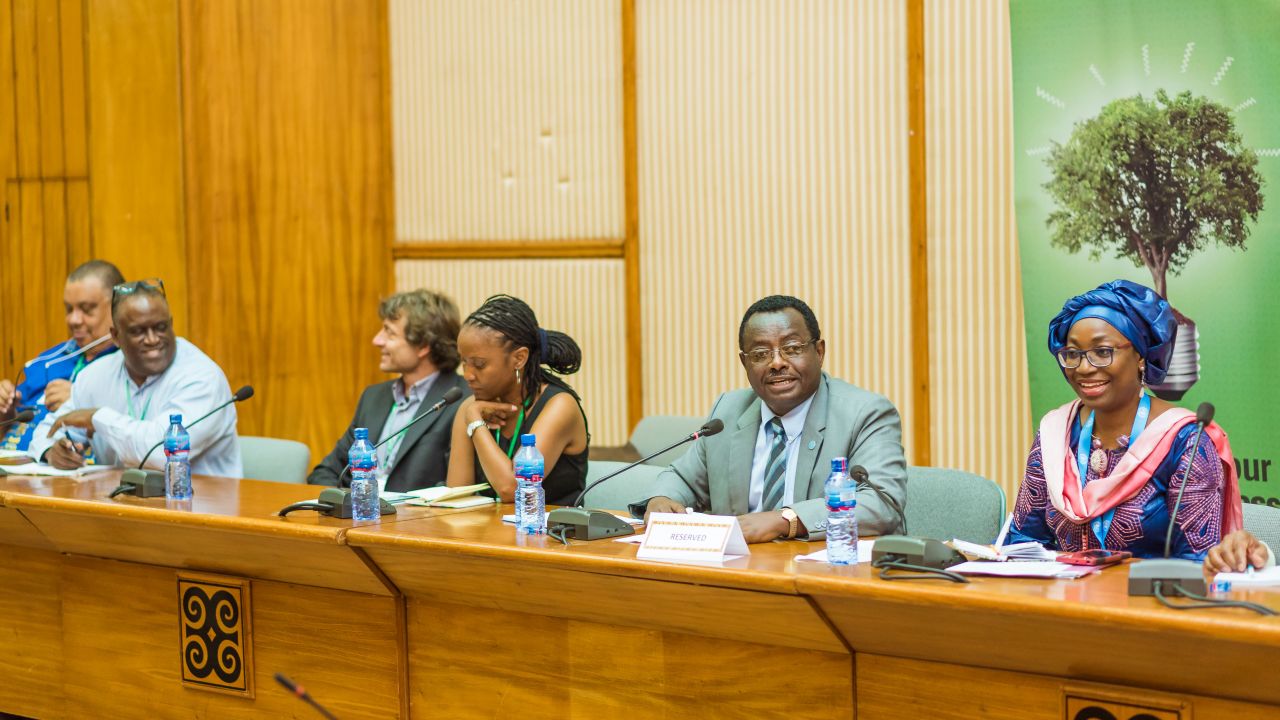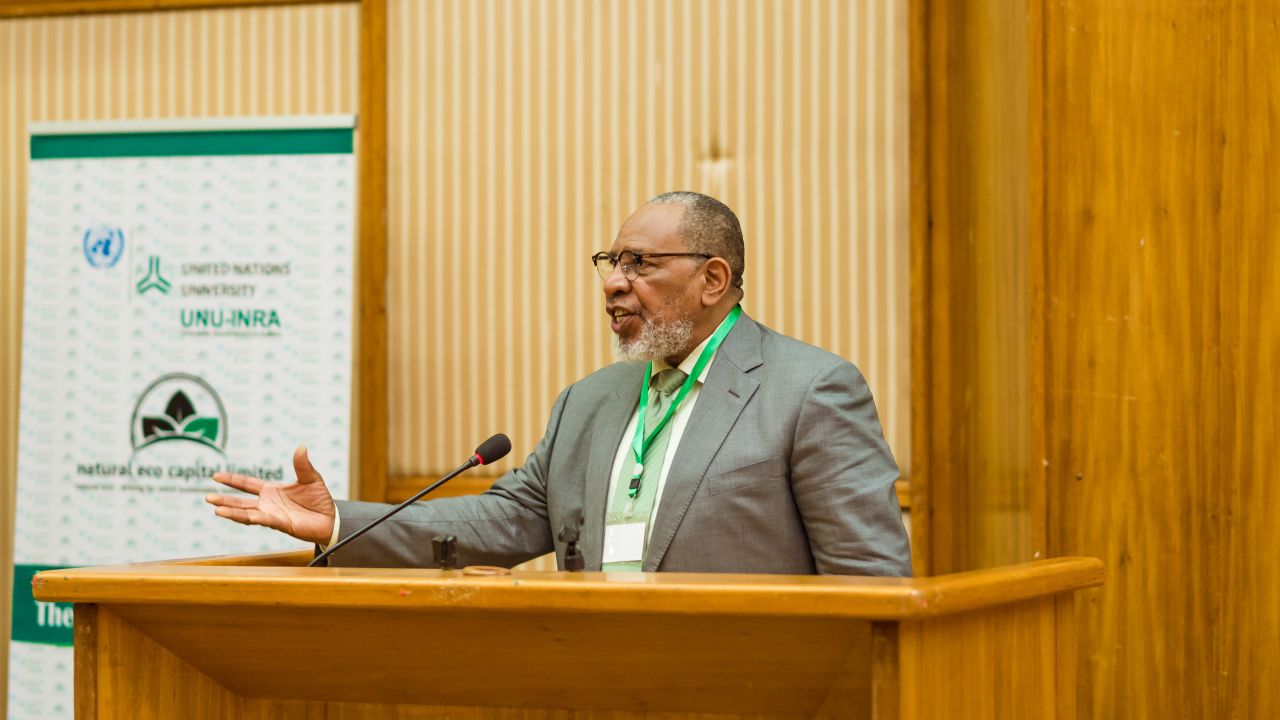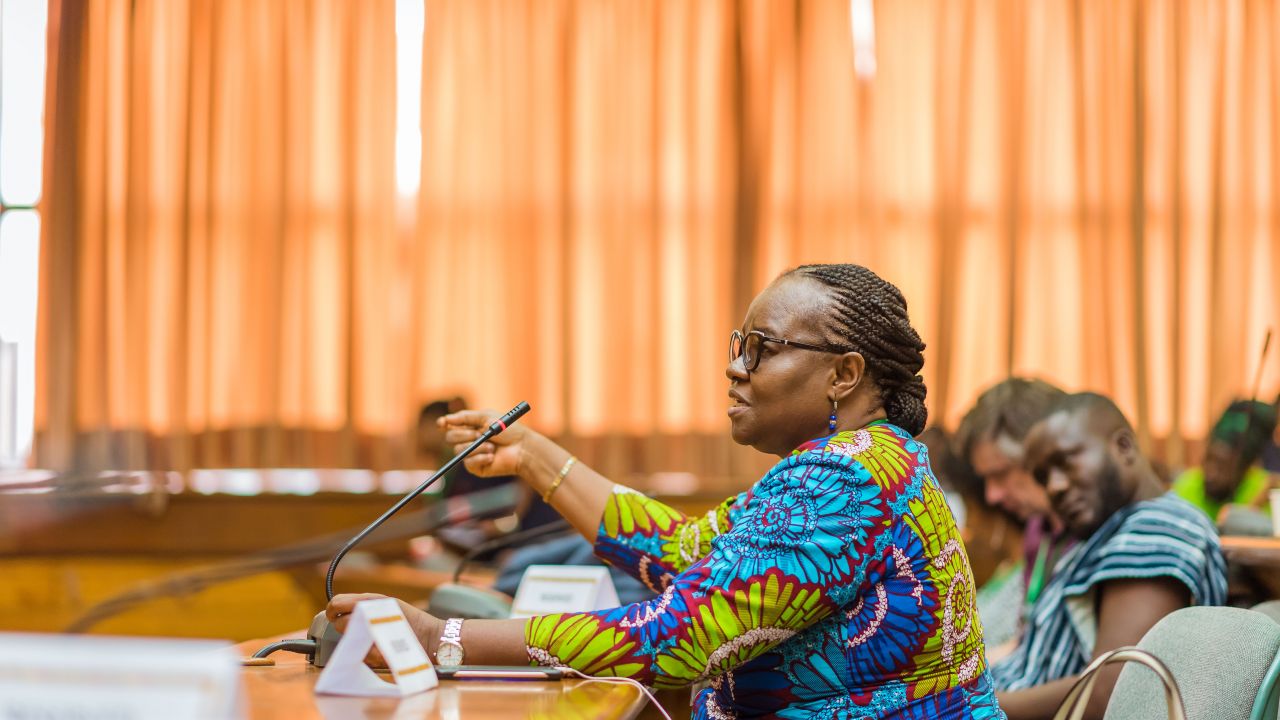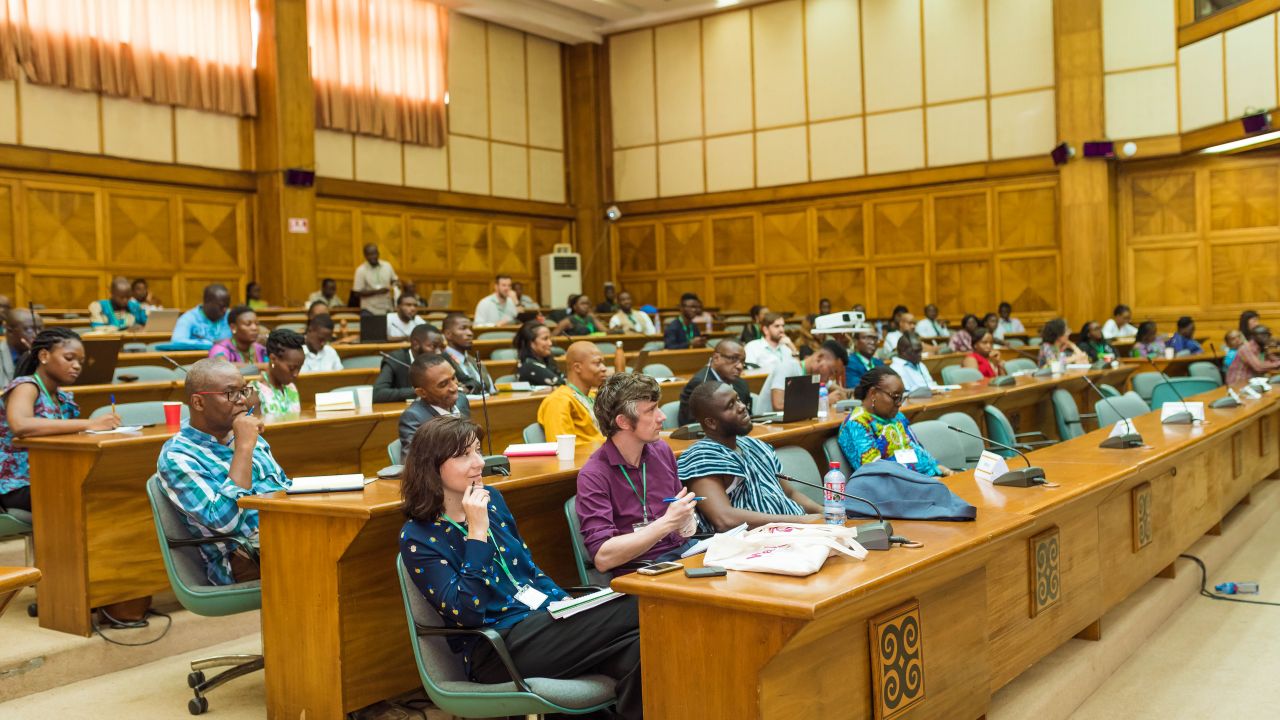Africa Climate Week: UNU-INRA event brings IPCC 1.5 report to Africa
-
March 26, 2019 Accra

Dr Haile Gebriel Abebe (5th from left) addresses the gathering. With him from l-r are: Prof Chris Gordon, Dr James Murombedzi, Dr Michele Leone, Dr Margaret Angula, Dr Fatima Denton, Dr Youba Sokona (hidden)
On 20 March 2019, UNU-INRA co-convened a panel discussion on the margins of the Africa Climate Week to provide platform for African climate scientists to discuss the Intergovernmental Panel on Climate Change (IPCC) 1.5 report as it relates to Africa.
Held on the topic “Only 12 years to bring global warming to 1.5°C – 1.5 report and why it matters for Africa” moderated by Dr Haile Gebriel Abebe, Assistant Director General and Regional Representative for Africa, FAO/RAF, and featuring a keynote statement by Dr Youba Sokona, IPCC Vice Chair, the discussion highlighted the continent’s climate risks and climate process challenges, and outlined context-appropriate pathways towards a safe and climate-secure future for Africa.
Full report of UNU-INRA activities at the Africa Climate Week now out. Read here.
First, Dr Sokona emphasized the need to implement urgent and far-reaching transformations in four key sectors – namely energy, land, urban infrastructure and industrial systems – critical to efforts to build resilience.
Dr Fatima Denton, Director of UNU-INRA, shared that Africa holds the strongest promise of combatting climate change. She explained that as a continent still in the process of developing its infrastructure, there is opportunity to get it right the first time by investing in infrastructure that facilitates safe growth.
Speaking on partnerships, Prof Chris Gordon, Environmental Scientist and former Director of the Institute of Environmental and Sanitation Studies (IESS), University of Ghana highlighted the need to break down artificial barriers between academia, policy and industry to help address knowledge deficits and facilitate research-in-use (Ri U). He underscored the need for Africa to have an African voice, and find African pathways based on gaps identified by Africans. This, he noted requires the transformation, at the policy level, of curriculum design and the way certain disciplines ate taught to improve education outcomes and make graduates fit for addressing climate issues.
Dr Michele Leone, Senior Program Specialist (Agriculture and Environment), IDRC reinforced Prof Gordon’s submission, adding that it is important to deploy capacity at the right places. He explained that while substantial capacity has been built, there is need to enhance influence and impact through the creation of research networks – networks that have the relevant size and scope, are transdisciplinary and rooted in diversity. This, he said would help scale up partnerships and achieve stronger and more diverse voices.
Dr James Murombedzi, heading the African Climate Policy Centre of UNECA, underscored the need for countries to curb their ‘addiction’ to fossil fuels and called for an increase in African influence in the international climate process, specifically processes and decisions relating to Africa.
Dr Margaret Angula, Senior Lecturer (Geography and Environmental Studies), University of Namibia, while making reference to evidence that 89 percent of African countries are warmer than the 1.5 global average, said there was the need to increase awareness and urgency for climate issues among political representatives. She outlined three action points for Africa, namely, investing in the two main at-risk sectors: agriculture and water systems, increasing investment and diversifying funding sources, and paying attention to demographic differences to ensure climate interventions do not exclude minority groups.
Panelist presentations were followed by a brief question and answer session, to give the highly engaged participants opportunity to voice concerns and interact with the experts.
Bringing discussions to a close, Dr Abebe reiterated views expressed by the panel members, stressing the need to contextualise conversations relating to Africa in Africa.
He thanked UNU-INRA and the Ghana Climate Innovation Centre (GCIC) for organising the event and giving platform to African scientists to air African voices. He also thanked participants for turning up in large numbers for the event.
The event featured seven leading African climate and environment experts and was attended by scores of participants.
Other Events
In another event themed “Green Economy = Green jobs – beyond business as usual to climate resilient development – a solution space,” the Ghana Climate Innovation Centre (GCIC), in collaboration with UNU-INRA, brought together a selection of green entrepreneurs (beneficiaries of the GCIC project) and members of the GCIC project team to share lessons and experiences under the project.
It was a practical session that served to showcase green solutions, demonstrate what works and the positive impacts generated from the range of GCIC beneficiary businesses, as well as the benefits and processes of the GCIC. The event was well-attended, including by budding green entrepreneurs, business owners and policy actors.
Other activities
In other activities, Director, Fatima Denton on 18 March participated in a panel meeting organised by the United Nations Development Programme (UNDP) and the Government of Ghana under Ghana’s Nationally Determined Contribution (Gh-NDC) Investment Forum. It was held on the topic “Adapting to Climate Change: Resilience, Security and Finance.”
Similarly, on 21 March, Dr Denton participated in a panel discussion organised by the United Nations University Institute for Environment and Human Security (UNU-EHS), joining other experts to discuss the topic “Leveraging University Platforms in the Implementation of NDCs, UNSDGs and Global Climate Action.”
The Africa Climate Week 2019 was hosted by the Government of Ghana from 18 – 22 March in Accra, Ghana. It was held ahead of two other regional Climate Weeks – the Latin America and Caribbean Climate Week, and the Asia Pacific Climate Week – all organized with the overarching goal to support the implementation of countries’ NDCs under the Paris Agreement and climate action to deliver on the Sustainable Development Goals.


